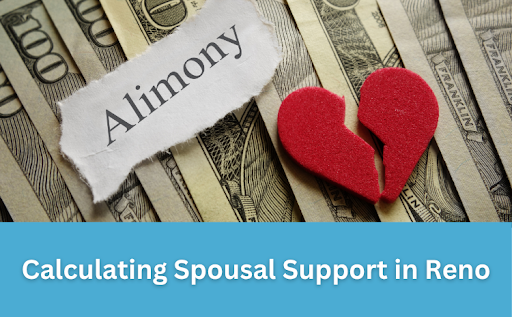
Alimony in Nevada: No One-Size-Fits-All Formula
Unlike child support, Nevada does not use a fixed statewide formula for alimony (spousal support). Judges decide what is “just and equitable” after reviewing the statutory factors and the proof you present. That means your story + numbers—budgets, earning-capacity evidence, tax returns, and disclosures—drive outcomes.
The Nevada Factor Test (What Judges Look At)
When awarding alimony and setting the amount, courts must consider factors that commonly include: each spouse’s financial condition and property; duration of the marriage; income, earning capacity, age, and health; standard of living during the marriage; homemaker contributions; marketable skills acquired during the marriage; and the property awarded in the divorce. Judges can consider any other relevant factor as well.
Practice tip: The stronger your documentation (budgets, bank/credit statements, W-2s/1099s, personal financial spreadsheets, vocational evaluations), the clearer your “need vs. ability to pay” picture becomes.
Types of Spousal Support You May See
1) Temporary (Pendente Lite) Support
While a case is pending, a judge can order temporary maintenance to cover necessities and to help both sides “carry on or defend” the case on relatively equal footing. This is grounded in NRS 125.040.
2) Rehabilitative / Transitional Alimony
Designed to help a spouse become self-supporting through education, training, or re-entry into the workforce. Nevada law expressly allows courts to set deadlines to begin the program and to award additional funds for testing, tuition, fees, job-search support, and even subsidizing an employer’s training costs—when the court finds rehabilitative alimony is appropriate.
3) Periodic or Lump-Sum Alimony
The decree may order monthly payments for a set period or a single lump sum, depending on what the court finds just and equitable. Unless the decree says otherwise, periodic payments end on the recipient’s remarriage or either party’s death.
How Courts Actually “Calculate” Alimony (The Practical Workflow)
- Establish Need & Ability to Pay
- Recipient’s budget: housing, utilities, transportation, health insurance, food, children’s expenses not covered by child support, debts.
- Payor’s cash flow: gross income, mandatory deductions, necessary living expenses, existing support obligations.
- Evidence: tax returns, pay stubs, profit-and-loss statements (for the self-employed), bank/credit statements.
- Recipient’s budget: housing, utilities, transportation, health insurance, food, children’s expenses not covered by child support, debts.
- Apply the Factor Test
- Right-Sizing the Award
Duration: How Long Can Alimony Last?
Nevada does not impose a rigid duration formula. Longer marriages and large earning-capacity gaps typically support longer (or larger) awards; shorter marriages often see transitional or rehabilitative structures. The court can tailor duration to the case facts, and it can end earlier upon remarriage or death unless the decree says otherwise.
Modification After Divorce (The “20% Rule” & More)
Periodic alimony that has not yet accrued may be modified upon a showing of changed circumstances. By statute, a 20% or greater change in the payor’s gross monthly income requires the court to review the award. Accrued amounts generally cannot be modified.
Common scenarios: job loss/reduction, health issues affecting earnings, significant promotion/raise, or retirement planning. Bring updated financials—tax returns, year-to-date pay records, and supporting documents.
Can Parties Agree to Modify Later?
Yes. Nevada allows post-judgment modification by written stipulation signed and acknowledged by both parties and approved by the court. This is separate from the statute’s “changed circumstances” path. Justia
Attorney’s Fees & Support During Litigation
Even apart from temporary maintenance, the court may award a reasonable attorney’s fee to either party. And while your case is pending, NRS 125.040 allows orders providing money to maintain the household, support children, and ensure both sides can litigate on relatively equal footing.
Taxes: The Post-2018 Federal Rule
For divorce or separation agreements executed on/after January 1, 2019, alimony is not deductible by the payor and not taxable to the recipient for federal tax purposes. Older agreements generally keep the old rule unless later modified with specific “opt-in” language to the new regime. Always consult your tax professional. IRS+1
Evidence That Moves the Needle
- Detailed monthly budgets (both sides) tied to statements
- Income proof: W-2s, 1099s, K-1s, P&Ls, balance sheets (for businesses)
- Vocational evaluations showing earning capacity, timelines, and re-training options
- Health documentation if medical conditions impact work ability
- Proof of contributions during marriage (homemaker years, support for the other spouse’s education/training)
FAQs: Reno Alimony
Is there a Nevada alimony calculator?
No. Nevada judges apply the statutory factors and case-specific evidence; there’s no statewide formula. Justia
Can I get support while the case is pending?
Yes. Courts can order temporary maintenance and even fees so both sides can litigate. Justia
When does alimony end?
Unless the decree says otherwise, periodic payments typically end at death or the recipient’s remarriage. Justia
Can my alimony change later?
Possibly. Future payments may be modified for changed circumstances. A 20% swing in the payor’s gross monthly income requires a review. Justia
What about rehabilitative alimony—what can it cover?
Courts can order funds for testing, skills evaluations, specific education/training costs, job-search assistance, and even employer training subsidies—with deadlines to start the program. Justia
Talk to a Reno Alimony Lawyer
Every spousal-support case turns on facts, numbers, and strategy. Anderson Keuscher PLLC builds evidence-driven presentations that fit Nevada’s factor test and your long-term goals—whether you’re seeking temporary support, negotiating rehabilitative terms, or pursuing a modification.
Call our Reno office or request a consultation to discuss exposure, strategy, and settlement options.
